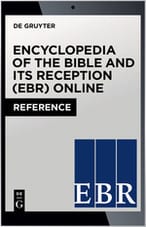The Importance of the Bible’s Cultural Contexts
Constance Furey has recently started to work as main editor for the area Christianity on the Encyclopedia of the Bible and Its Reception (EBR). Here she talks about her new role, the EBR, and why the Bible's cultural contexts matter.
This is the sixth part of a series dedicated to the EBR (Encyclopedia of the Bible and Its Reception Online). EBR is a research tool for scholars in biblical studies and related fields.
I am a scholar of Renaissance and Reformation Christianity, especially interested in the emergence of new types of religious and intellectual communities and theoretical questions of relationality and intersubjectivity. I was trained at the University of Chicago and I am currently at Indiana University where I am the chair of the Department of Religious Studies.
My work focuses on 16th-century early modern Christian humanism, religion, and literature, and in particular, English literature. All of these disciplines take an interest in biblical reception and interact with the Bible consciously or unconsciously. These are all things that have had multiple effects in the cultural sphere and in religious contexts and which I have been working on.
“EBR doesn’t look at the Bible and its reception narrowly, i.e. solely in terms of exegesis per se. It also explores the influences the Bible has had on culture and how the understanding of the Bible has changed over time and in different cultural contexts.”
One of the things that draws me to the Encyclopedia of the Bible and it’s Reception is that EBR doesn’t look at the Bible and its reception narrowly, i.e. solely in terms of exegesis per se. Instead, it also explores the influences the Bible has had on culture and how the understanding of the Bible has changed over time and in different cultural contexts. I think about that in terms of my scholarship.
EBR is an extraordinary resource with a range of topics, not just in terms of biblical names and places. It’s wonderful because of the kind of resources it offers scholars as well as students who are beginning to look for ways to understand culture. Today we talk about literacy, but as I demonstrate to my students texts, and especially the Bible, can be read in multiple ways. The Bible is actually not the problem, it is the background needed to understand it.
Cultural Awareness of Bible Reception
Recently, for example, I showed a group of students who claim not to have read the Genesis account that there are often references to Adam and Eve in pop-culture. In particular, the story of Eve continues to be used in product marketing. For example, there is a hard cider in the US called “Original Sin Hard Cider.” The advertising for the product draw on biblical motifs in ways that students recognize. Even students who tell me that and they don’t really know the Bible and have not read it realize that they have a cultural awareness of its reception. An example like this becomes a gateway for them to deepen their knowledge.
The editorial board of the Encyclopedia is rather large and I am one of the main editors for the area Christianity. I coordinate the group of eight area editors along with my colleague Brian Matz. Our collaboration as a team gives us all an opportunity to learn from each other. Each of us has very specific areas of expertise and we often have fascinating conversations on different aspects of topics in order to determine the necessary material an entry must have so that readers find all the essential information required.
At the last editorial board meeting we discussed, for example, the entry “parchment” and discovered that the biblical scholars in the areas Hebrew Bible/ Old Testament and New Testament had a very different view of the entry’s content. It is fascinating to see the final result on the page when all of the discussions come to fruition.
EBR provides the research of many different scholars from different countries from all over the world. It is a truly global project.
It has been an amazing experience to work on EBR and been actually very inspiring. De Gruyter has committed a lot of resources to the Encyclopedia. The development has been continuous due to the strength of the in-house editorial staff and the well-known tradition of excellence of the press.
[Title Image by jorisvo on Getty Images]
